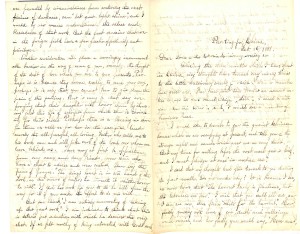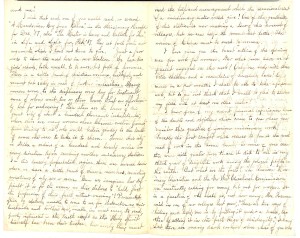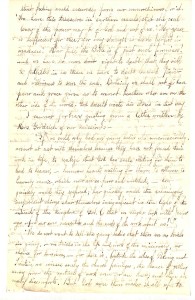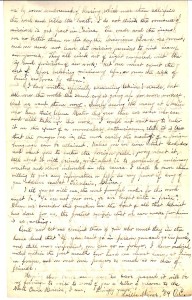Document 2: 1884 Letter
Author: Luella Miner
Recipient: Oberlin Young Women’s Missionary Society
Date: 16 February 1888
Source: Religious Organization Records, Record Group 19/03/01/ Box Number 2, Oberlin College Archives
Document Type: autograph letter signed
Sarah Luella Miner was born in Oberlin, Ohio, and was exposed to missionary work early in life through her father, Daniel Irenaeus Miner. After graduating from Oberlin, Luella Miner worked in Kentucky and Tennessee teaching freed people before moving to China in 18871. Single women, though rare and stigmatized in the United States, were common in missionary communities. Her family had kept a tradition of mission work. Thus, she did not risk straining relations with her family as much as other women who chose missionary service did. Unlike Miner, other women challenged family traditions when they went abroad to work independently. Miner acknowledged this in the letter.
Miner wrote this letter shortly after moving to China, at the site of her first mission. The available copy is handwritten, and was aimed at female Oberlin students who might be considering missionary work after graduating. Miner expressed certainty that the work she was doing (and encouraging others to do) could only be done by women, and insisted that more American missionary women needed to go to China and around the globe. The texts she referenced, found in The Missionary Herald and Life and Light for Woman, show more examples of the kind of rhetoric that surrounded Miner in the 1880s. These publications were evidently popular reading in the circle of the Society. Luella Miner explained the role she assumed as a woman of “civilization” and how she found empowerment for herself and other Christian women within that role.
Pao-ting Fu, China
Feb. 16, 1888

Dear Girls of the Oberlin Missionary Society,-
During the three months which I have spent in China, my thoughts have turned very many times to the little Missionary Society of which I was a member four years ago. Four years must have brought an almost entire change in your membership, still, if I could be with you when this letter is read, I would see a number of familiar faces.
I would like to describe to you the quaint Chinese houses which we are occupying at present, and tell you of the strange sights and sounds which greet me on every hand. But my time for writing before the next mail goes is brief, and I must plunge at once “in medias res.”2
I said that my thoughts had often turned to you during the past months. Do you wonder why? It is because I see, as never before, that “The harvest truly is plenteous, but the labourers [sic] are few.”3 I wish that you could all see, as I can see now, these fields “white for the harvest.” How gladly quickly with some of you, doubts and falterings [sic] would vanish, and how gladly you would say, “Here am I, send me.”4

I wish that each one of you would read, or reread, “A Macedonian Cry from China”, in the Missionary Herald for Dec., ’875, also “The Master is Come and Calleth for thee6,” in Life and Light for Feb. ’877. They set forth facts and arguments which I have not time to give. Just a few words to show the need here in our station. We have two girls’ schools, both small, to be sure, but full of promise. There is a little band of christian [sic] women, faithful and earnest but sadly in need of further instruction. Many women come to the dispensary8 every day for treatment, some of whom wait two or three hours. What an opportunity here for seedsowing [sic]! Then there are the homes of this great city of about a hundred thousand inhabitants, where there are many women whom Chinese custom prevents from coming to us, who would listen gladly to the truth if some one were to take it to them. From this city we strike a radius of a hundred and twenty miles in every direction before reaching another missionary station. In this densely populated region there are several towns where we have a little band of church members, consisting sometimes of only six or seven. Can we imagine how difficult it is for the women in these stations to “hold fast the profession of their faith without wavering”?9 [sic] Persecuted often by relatives, unable to come to us for instruction as their husbands and brothers can, unable, in most cases, to read, poorly instructed in the truth except as the Holy Spirit himself has been their teacher, how sorely they must need the help and encouragement which the occasional visit of a missionary sister could give! One of the gentlemen of this station is now making a tour of this circuit of villages, but he can help the women but little.10 The women of China must be saved by women.
I have given you the barest outline of the opening here for work for women. Now what force have we at present engaged in this work? Only one lady with three little children and a mountain of household cares!11 Of course in a few months I shall be able to take up some work, but do you not think that I would be glad to share my field with at least one other sister?

I know from f [sic] very recent personal experience some of the doubts and objections which come to you when you consider this question of foreign missionary work. Probably the first thought which occurs to you is the great need of work in the home land. To none of you can this come with greater force than it did to me in my third year of delightful work among the colored people in the south.12 But what are the facts? The American Missionary Association and the New West Educational Commission are constantly calling for money but not for workers. It is a question of who shall go, not how many. Miss. For[e]man said in one of her colleges last year, “There are two ways of hiding your light; one is by putting it under a bushel, the other by setting it in the full blaze of christianity.”13 I know that there are many dark corners when those of you who are prevented by circumstances from entering the vast plains of darkness, can “let your light shine”, [sic] and I would by no means underestimate the value and blessedness of that work. But the fact remains that we in the foreign field have a far greater opportunity and privilege.14
Another consideration will place a seemingly insurmountable barrier in the way of some of you, namely, the thought of the debt of love which you owe to your parents. Perhaps it is because they seem really to need your care, perhaps it is only that you cannot bear to give them the pain of the parting. But it may be that they are praying that their daughter will honor them by choosing just this life of sacrifice from which she is shrinking for their sakes. Perhaps there is a blessing in store for them as well as for her in the sacrifice. And surely the all-powerful, all-loving Father who calls us to his work can and will take care of the loved ones whom we leave behind us. There may at first be opposition from very near and dear friends, from those who have a right to advise and even control. Then by the power of prayer. [sic] “The king’s heart is in the hand of the Lord, as the rivers of water; he turneth it whithersoever he will15.” If God has work for you to do he will open the way for it if you make the effort to do his will _ [sic]16

But you think, “I am entirely unworthy of taking up this great work.” I am inclined to think that this is Satan’s pet seduction with which he deceives the very elect. If we felt worthy of being entrusted with God’s work, that feeling would assuredly prove our unworthiness for it. “We have this treasure in earthen vessels, that the excellency of the power may be of God and not of us.”17 “My grace is sufficient for thee, for my strength is made perfect in weakness.”18 How full the Bible is of just such promises! And we have no more doub right to doubt that they will be fulfilled in us than we have to doubt Christ’s power and willingness to save the soul. Certainly we shall not fr [sic] have power and grace given us to convert heathen who are on the other side of the world. God doesn’t waste his stores in that way. I cannot forbear quoting from a letter written by Mrs. Goodrich19 of our Mission:—
“If we could only lead our young ladies who, unconsciously, are not at rest with themselves because they have not found their work in life, to realize that God has souls waiting for them to lead to heaven,— human hearts waiting for them to attune to heavenly music, which now are so poor and wretched,— how quickly would they respond; how quickly would the seemingly important things show themselves insignificant in the light of the interests of the kingdom of God. O that we might look with Jesus’ eyes upon our own necessities and the needs of the work about us!”
“We do not want to tell the young ladies that there are no trials in going.—no trials in the life and work of the missionary, no chance for heroism, — for there is. Outside the cities of Peking and Tientsin one misses sorely the church privileges, the chance of getting away from the routine of work even for an hour: and there are many discomforts. But God more than makes it all up to us by some undreamed-of blessing, which more than satisfies the soul and fills the heart. I do not think the romance of missions is yet past in China. The roads and the inns are no better than on the day the American Board was formed: and one need not leave the mission premises to find many annoyances. They all sink out of sight compared with the joy and privilege of our work; but one must count the cost of before entering missionary life, or run the risk of being over borne [sic] by them.”
I have written especially concerning China’s needs, but all over the world the same cry is going up for more workers. And we want them now. Surely among the many at Oberlin who leave their Alma Mater this year there are some who can and will take up this work. I would not want any to enter it on the spur of a momentary enthusiasm, still it is true that the younger one is, the more easily the mastery of a foreign language can be attained. Unless you are sure that God does not want you to enter the foreign field, pray about it, talk about it with friends, write about it to secretaries of missionary societies and others interested in the cause. I shall be more than willing to give any information or help in my power if any of you address me at Tientsin, China.
With you as with me, the most powerful motive for this work must be, “Ye are not your own, ye are bought with a price.”20 When we consider this question in the light of all that Christ has done for us, the greatest sacrifice that we can make for him is as nothing.
And now let me remind those of you who must stay in the home land that “If you can’t go in person you can go in purse”, [sic] and still more important, you can go in prayer. I never realized until within the past months how hard one must lean, at times, on prayer, not in ones [sic] own prayers so much as in those of friends.
Hoping that before many months have passed it will be my privilege to write to some of you a letter of welcome to the North China Mission, I am, Lovingly Yours,
Luella Miner ’84 O.C.
Transcribed by Revital Bernstein, 8 May 2015
1 Jane H. Hunter. “Miner, Sarah Luella”; http://www.anb.org/articles/09/09-00937.html; American National Biography Online Feb. 2000. Accessed May 7, 2015.
2 Latin: “In the middle of the action.”
3 Matthew 9:37.
4 Isaiah 6:8.
5 Here Miner is referring to a letter from a committee at the North China Mission detailing their needs for more workers and money, part of which was published in The Missionary Herald in December 1887. Here is a passage from the letter: “It comes from the false creeds and no creeds of all classes alike. It is the inarticulate wail of infants coming to an untimely end because, forsooth, deformed or of the female sex. It is the sobbing of woman, who, suffering as a slave or beast, knows not the meaning of woman hood. It is the plea of loveless marriage and cruel concubinage” (527.) In context, this quote is describing the Chinese people’s perceived need for Christianity, education and economic relief, particularly among women.
6 John 11:28.
7Ada Haven articulates the ways of deciding whether to go into foreign missionary work, while encouraging young women to choose China over Japan. Luella Miner, Ada Haven, and Mrs. Sarah B. Goodrich are each listed as missionaries in China as “Missionaries of the Woman’s Board of Missions of the Interior” in the same publication on page 475. Neither of these women studied at Oberlin. Ada Haven, “The Master is here and Calleth for Thee.”Life and Light for Woman (1887): 65-68, 475.
8 “Dispensary” referred to a pharmacy or doctor’s office.
9 Hebrews 10:23.
10Imperial China was a highly gender-segregated society, where women of enough means did not leave their parents’ or husband’s house. Houses were separated into men’s and women’s quarters.
11 This is a reference to Desiderius Erasmus’ “The Manual of a Christian Knight,” written in 1501. The full sentence is “In matrimony what a mountain of household cares be there? What misery feel not they there which proveth and hath experience of it!” (Desiderius Erasmus, A Book Called in Latin Enchiridion Militis Christiani and in English The Manual of the Christian Knight, replenished with the most wholesome precepts made by the famous clerk Erasmus of Rotterdam, to which is added a new and marvellous profitable Preface (London: Methuen and Co., 1905)).
12 See Jane H. Hunter. “Miner, Sarah Luella”; American National Biography Online Feb. 2000, Accessed May 7, 2015, Web address.
This is referring to her years between 1884 and 1887 when she taught at Fisk University in Nashville, Tennessee, as well as in Kentucky.
13 “Plains of darkness” likely refers to foreign countries not Christianized. In her article on page 66, Ada Haven uses a similar metaphor, meaning that a light cannot be seen if it surrounded by a blaze; it can make a bigger impact in a dark place. (Ada Haven, “The Master is here and Calleth for Thee.”Life and Light for Woman (1887): 65-68).
14 An interesting view on how her privilege as a white American woman functions on an international level, but she is also talking about the privilege of being able to do this hard work for her Christian community.
15 Proverbs 21:1.
16 Miner is supplying an argument for women uncomfortable with the thought of leaving their parents who would be unwilling to let them travel in this manner.
17 2 Corinthians 4:7.
18 2 Corinthians 12:9.
19 Mrs. Sarah B. Goodrich operated a girls’ day school. It appears she was based in Tung-cho, where Luella Miner also worked (The Missionary Herald: Containing the Proceedings of the American Board of Commissioners for Foreign Missions with a view of Other Benevolent Operations, For the Year 1889. Vol. LXXXV (1889): 179, 200).
20 2 Corinthians 6:20.